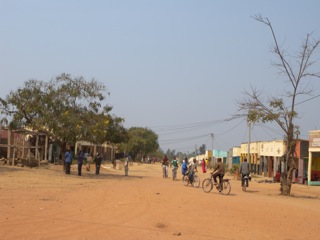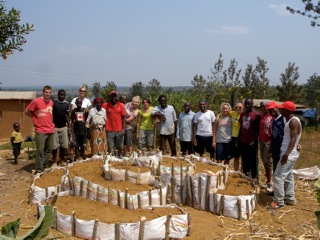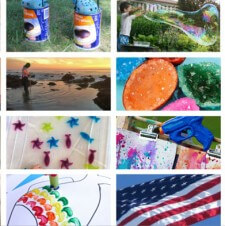First Days in Rwanda by Judy Chovan
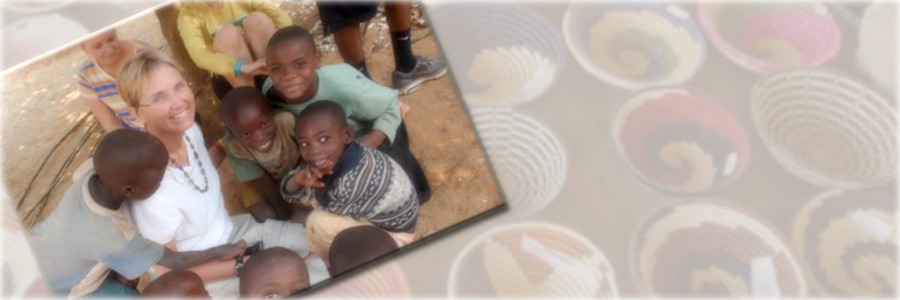
This article is based on a blog that I wrote for friends and family when I was in Rwanda for three weeks in July.
A quick update on my first few days in Gashora, Rwanda. Gashora is a village about 35 km south of the capital city, Kigali, Rwanda – about a one-hour drive. The main road is paved as are most of the main roads in Rwanda, and it’s not until we turn off for the village that the road becomes the more ubiquitous red clay, dusty road of sub-Saharan Africa. Gashora is located in the south central part of the country eight kilometers north of the border with Burundi. The region is not as hilly, the land not as fertile, and the climate a bit hotter and drier than the rest of the country. These factors contribute to a poorer and less dense population.
I am spending my time volunteering with the NGO Building Bridges Rwanda and tagging along with the students of Western Washington University (WWU) who are in Gashora for five weeks studying international aid and development models through a service learning curriculum. Specific projects the students are involved with include working with the women weavers of Covaga – a co-operative formed to provide an income for the women and alleviate poverty, teaching English at the health care center (the country switched from French to English five years ago and subsequently joined the Commonwealth. Rwanda is one of two nation members that were never a British colony), and building kitchen gardens for to grow green vegetables. The students have built gardens for genocide widows and one at the health center. The people are not starving, but malnutrition is rife. The people are poor, subsistence farmers and a typical diet consists of rice, potatoes, plantain, cassava and other starches. Even at our hotel ($20 night) there is little protein served with meals.
 It’s the dry season now so water is scarce and everyone – women, men, and small children – carry water in plastic jerry jugs on their heads up from the nearby lake or communal water source. I went to the new health center yesterday – a brand new building but in need of rudimentary things like beds and basic equipment. After I used the bathroom (the traditional squat kind as the two new ones were locked and no one knew where the keys where), and there was no water to be found for me to wash my hands – the spigots were dry and all the plastic water jerry cans were empty. I wondered what the health workers were using as the facility did not have running water that I saw.
It’s the dry season now so water is scarce and everyone – women, men, and small children – carry water in plastic jerry jugs on their heads up from the nearby lake or communal water source. I went to the new health center yesterday – a brand new building but in need of rudimentary things like beds and basic equipment. After I used the bathroom (the traditional squat kind as the two new ones were locked and no one knew where the keys where), and there was no water to be found for me to wash my hands – the spigots were dry and all the plastic water jerry cans were empty. I wondered what the health workers were using as the facility did not have running water that I saw.
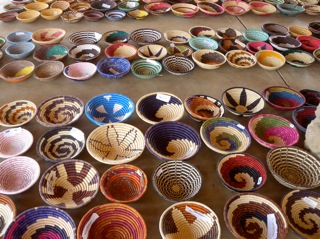 My contributions will be in three areas, helping the weavers develop their market and merchandising of their product, assisting any students working in health care issues, and working on an asset map to develop ecotourism in the area. I am amazed at the abundance of bird life – more than I have seen in many African countries. The hotel where we are staying is located on a lake approximately one kilometer from town. Rwanda is dotted with lakes and ours has both crocodiles and hippos, however we have yet to see either one, but the villagers are very vigilant. A few of us are going out in the morning on a boat with high hopes.
My contributions will be in three areas, helping the weavers develop their market and merchandising of their product, assisting any students working in health care issues, and working on an asset map to develop ecotourism in the area. I am amazed at the abundance of bird life – more than I have seen in many African countries. The hotel where we are staying is located on a lake approximately one kilometer from town. Rwanda is dotted with lakes and ours has both crocodiles and hippos, however we have yet to see either one, but the villagers are very vigilant. A few of us are going out in the morning on a boat with high hopes.
I had a horrible Marlin Perkins moment this morning. I get up early to go down to the lake to see what was up and about – ibises, a Fish Eagle, weaver birds, hammerkop, malachite kingfishers and much more. A pair of Giant Kingfishers insist on throwing themselves full force on the glass doors of the huts – driving us all a bit crazy. One hit my door at about 0430 this morning. It’s a bit daunting given the amount of force they hit with and the loud bang woke me up with a start thinking “hippo”? While I was down by the lake an aptly named murder of large Pied Crows (nine in all) attacked a Barn Owl. Along with a Tawny Eagle, they killed it. But it was a brutal and harrowing ten minutes as I was hysterically trying to drive the crows away and rescue the owl (yes I know I should not have interfered, nature red in tooth and claw, and all that). Sadly, I was not successful.
A few notes:
President Kagame (whose scholarly bespectacled looks remind me of Gandhi) is modeling the country, both economically and socially, after Singapore. Streets, even the dirt ones, are spotless. The colorful bicycle taxis we ride to the hotel when it’s hot are licensed (you ride on the back like a motorcycle on a padded rack). There is a plastic bag ban in the entire country! If you cross into Rwanda overland they search your belongings at the border for plastic bags. There are more women than men in Parliament. There is no barbed wire or fence of any kind surrounding the hotel grounds – I think a rarity in all of Africa.
Lastly, no one is supposed to use the terms Hutu or a Tutsi because all are Rwandans.
P.S. The best thing about Rwanda is there is nary a coconut tree in sight and no one has tried to sneak any coconut into my food.
Murabeho
Julie (my name in Kinyarwanda as ‘d’ is unpronounceable)
Judy is an avid traveller. She is passionate about learning about the world we share and the people with whom we share it. She studied both art history and marine biology in graduate school and spent most of her career working in museums, the last few years as a museum director. She and her husband, Bob Stavers live on San Juan Island and love to hike, bike, kayak, ski, and do just about anything adventurous out of doors. She is off next to Iran and is hoping everyone keeps their fingers off the button.


